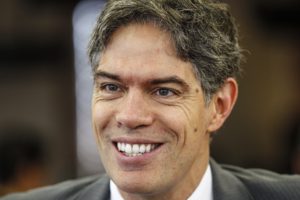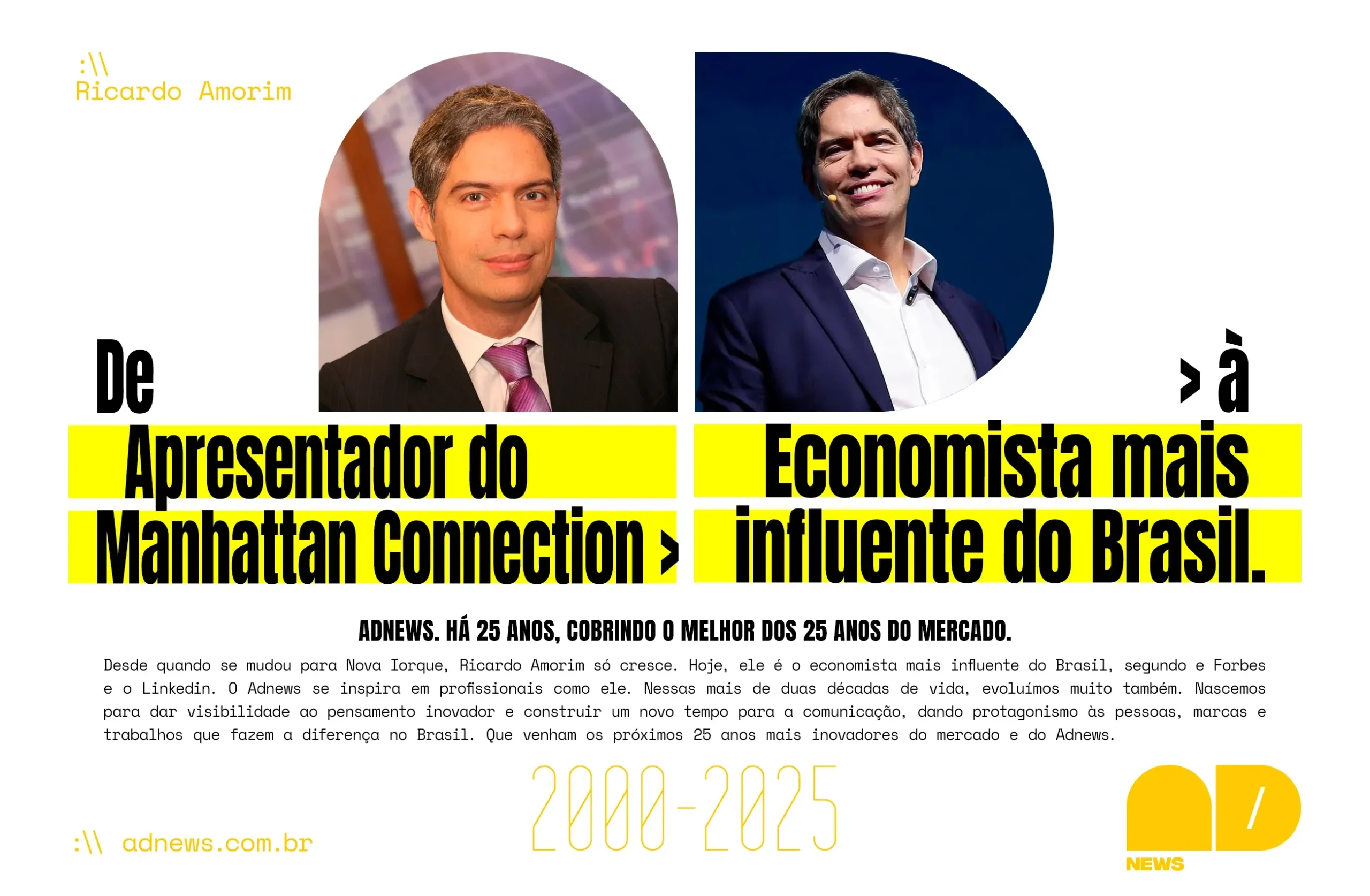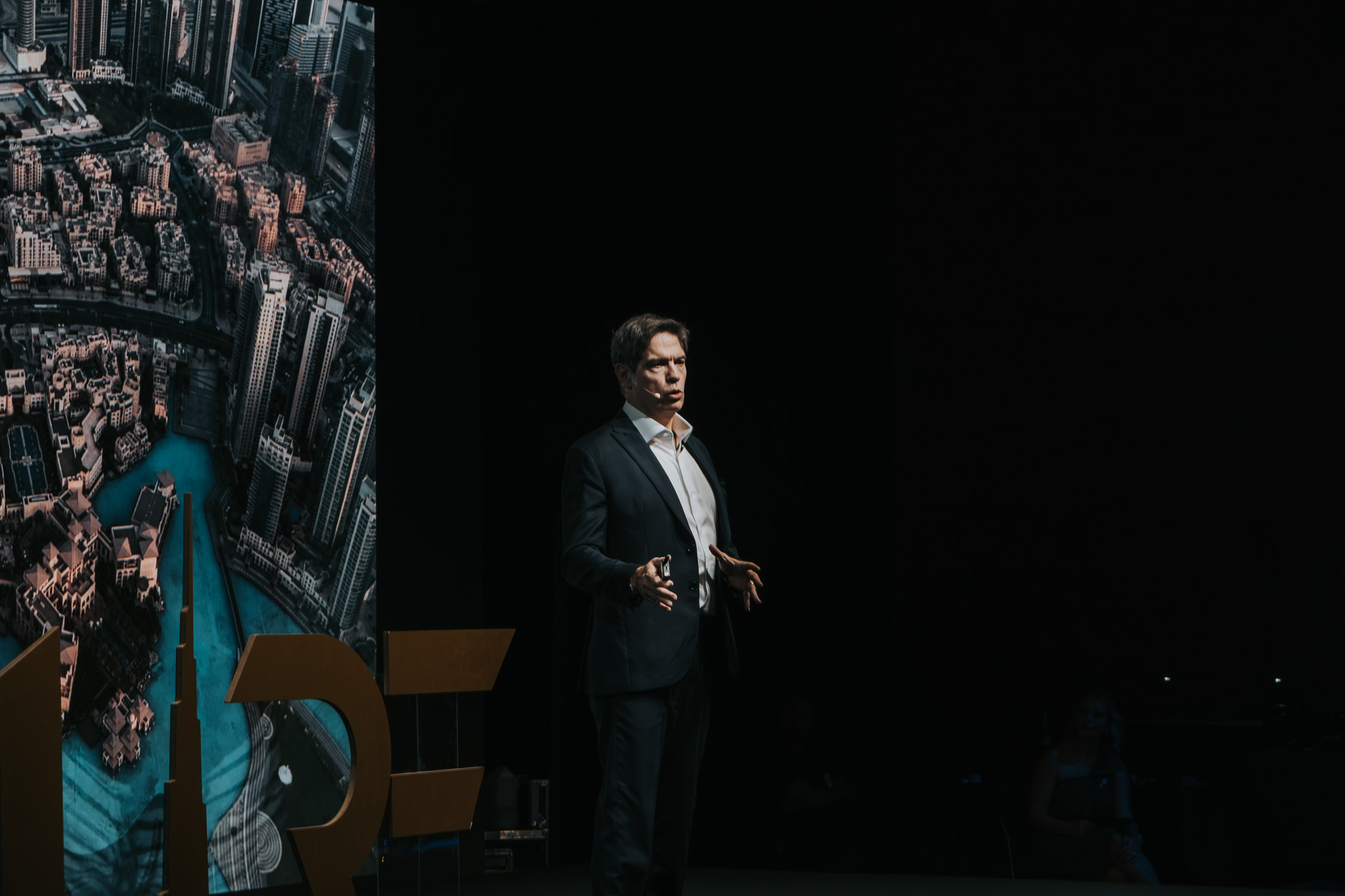08/2014
Por Ricardo Geromel
Ricardo Amorim is following the path of Joelmir Betting, a distinguished Brazilian journalist, radio and TV anchorman, and economics-specialized columnist, who died in 2012. Both have honed the skill to translate harsh and confusing economic concepts into easy-to-understand examples that please the average Joe. Just like Betting, Amorim participates in radio shows, writes in business magazines, gives speeches at conferences and companies, and has his own consultancy. Amorim is widely recognized in Brazil mainly for being one of the hosts of Manhattan Connection, the longest-running original program on Brazilian cable television and one of the most prestigious roundtable TV shows in Brazil.
I had a long lunch with Amorim in Sao Paulo at Limonn, one of the very few really good places in Itaim Bibi that are not way more expensive than a similar one in a trendy area in New York or Paris (even after discounting the exchange rate). Though two hours of talking with him felt like only 20 minutes, I came away feeling that I had just received a 20-hour crash course on economics for daily use. It is evident that Ricardo Amorim is comfortable in his shoes and knows which dragon he has decided to slay day in and day out. Asked about must-read books, he mentioned acclaimed authors that have mastered the art of turning complicated theories into exciting and informative jargon-free versions that please, educate and entertain people without much knowledge of economic theory. The following must-reads, according to Amorim, enable readers to stand on the shoulders of giants—always the best place to see the world:
The Most Important Thing by Howard Marks
The billionaire hedge-fund manager shares 20 easy-to-digest tips on how to consistently beat the markets.
The Essays of Warren Buffett: Lessons for Corporate America.
The central theme uniting Buffett’s lucid essays is that the principles of fundamental valuation analysis, first formulated by his teachers Ben Graham and David Dodd, should guide investment practice.
Super Freakonomics by Steven D. Levitt and Stephen J.
The unifying theme of this best-seller is that people respond to incentives, although not necessarily in ways that are predictable. Therefore, the law of unintended consequences is extremely powerful and applies to everyone: from schoolteachers to realtors to crack dealers.
Amorim was born in Brazil and educated in France. He worked in New York but gave up his green card to move back to Brazil. He still believes that South America’s largest nation is the new America, a place full of opportunities. He is clearly involved in many battles, from journalism to consulting to investing, but I wanted to know what makes him tick. My impression is that he is on a mission to educate Brazilians: “the only way to really change Brazil is by transforming Brazilians and the best way of changing people is by educating them.” It will be impossible to win that war alone, so I asked him to name comrades in this battle to educate Brazilians and Amorim named the three most prominent Brazilian change-makers:
Bel Pesce
A young woman who moved back to Brazil and will certainly be a change-maker. People from my generation are infected with pessimism. We lived in a Brazil that did not function well for too long. I am 43 so I lived through the hyperinflation, and a lot of people of my generation gave up on improving this country. Bel’s generation is immune to that. She is not afraid of taking risks and doing things differently.”
Movimento Brazil Eficiente (Movement Efficient Brazil)
One of Brazil’s biggest problems is its red tape and its tributary system. This group of businessmen is tackling these two areas, and I hope they manage to influence the legislative agenda in a way that creates lasting impact. I think this movement can make a difference before Bel, but keep that young woman under your radar. ”
Joaquim Barbosa, Former President of the Supreme Court
I am not sure if he will be a change-maker, but he definitely has the potential to become one. Barbosa became a symbol of the fight to moralize this country. How will he use this? How is this going to evolve? I do not know. At the same time, it is a risk. Let’s remember that Collor [Brazil’s ex-president involved in a number of corruption scandals] was elected by positioning himself as a reformer that would moralize this nation.”
Amorim has impactful and unexpected remarks that remind me of soccer star Neymar. The Barcelona forward taught the world to expect the unexpected from him. Many times, Neymar receives a pass in the midfield – where most players would just give a pass back and not try anything fancy – and the fans’ heartbeats go up because they know Neymar rarely does something obvious. Neymar usually tries to dribble past a few opponents or find open teammates in situations where most players would just play it safe (and boring). Amorim has a similar attention-grabbing ability. I simply asked him an open question about billionaires and his answer included cultural remarks, the influence of religion and he even mentioned a research study. Here is a short summary of his answer: “Brazilians still see wealthy people as those who have some kind of connection with the government…Rich Brazilians still tend to hide their wealth while Americans are proud to see their names in FORBES magazine… Many affirm that differences between Catholics and Protestants in their attitudes toward wealth played a role historically.” My fiancée, who was having lunch with us, introduced herself and said she used to work for pharmaceutical colossus Merck. Amorim went on talking about the challenge faced by huge pharmaceutical companies, “these kind of companies invest so much in Research and Development to come up with groundbreaking products. The ones that hit the market have to pay for all the others that failed while still generating profits for the company. ” Listening to Amorim and his wise comments on every single topic, I remembered that in college I wanted to be an economics major so I could dedicate my life to knowing a lot about many different topics. Later, talking about Dilma Rousseff, he exposed the dangers of someone who believes to know it better than everyone else and not count on specialists. “Rousseff was sold as a great manager, but [she] never delivered. Instead, she proved to be a centralizer who wants to decide every single thing. This leads to paralysis on one hand and bad decisions on the other. Since nobody can know everything about everything, her decisions are not the best on all fronts.” I have learned to aim to know everything but don’t make decisions as if you actually knew it all without consulting specialists of each field.
My fiancée and I enjoyed the class, but there was so much content that it was hard to take good notes. If I put my hand down to write something I would be missing a good comment. Fortunately, we recorded our conversation. Below are extracts of Amorim’s thoughts:
Brazil’s Real Estate
”There is not a bubble! People have been saying that for the past six years, and now prices are 10 times higher than they used to be. I am not saying there will not be a real-estate bubble; I am saying it is totally not about to burst.”
The Problems of Education in Brazil
If your [Brazilian] son says that he wants to become a teacher, you are going to try to change his mind since school teachers are paid so poorly. We also need a big transformation to start teaching skills instead of knowledge.”
Brazili’s Elections
A recent study reveals that a little more than 40% of Brazilians have never heard of Eduardo Campos* and about 35% of Brazilians affirm to not know him well. That means that 3 out of 4 Brazilians do not know him. For Neves, it is about 60%. Therefore, when the campaigns really start these two candidates will grow way more than the current president [Dilma Rousseff]. By the way, this study reveals that 1% of Brazilians do not know who Dilma Rousseff is. I think that the best for Brazil would be for Dilma to leave but I do not know who would be better, Campos or Neves. Both Neves and Campos are more charismatic than Dilma. They are less charismatic than Lula, but way more than Dilma”
*By the way, Eduardo Campos just died in a plane crash yesterday.
Advice for Young People
“First invest in yourself. Second, expose yourself to other ways of living and thinking. Travel!”
On China
China worries me. I think they have a credit and real-estate bubble. When they eventually burst, it is going to be chaos. In 2008, 2% of all euro bonds in dollars, yen and euros were of Chinese companies. In 2014, that was 14%. That is just external credit.”
On US Dollar
We have bubbles in everything that is dollar-related. Because the Fed has printed so much money, we have recently seen the most expensive painting ever sold ($155 million for a painting of Francis Bacon), a diamond sold for $60 million, and many other exampes.
The Next Crisis is Just Around The Corner
From here to the end of the of next year, there is over a 60% chance that the US stock market will crash. When it does, you will think that everyone was really happy when Lehmann got burst. Obviously, I do not know if it will happen tomorrow or in December of next year.”
On Manhattan Connection and Why Old Women Love him
We also talked about how he ended up at Manhattan Connection and he told me that research has shown that, surprisingly, the demographic that adores him the most is women over 50. Six months after he became a host of Manhattan Connection, the audience of women over 50 skyrocketed 110%. He says, “my only theory to explain that is that these ladies believe me to be an ideal son-in-law.”
In case you are asking yourself why I labeled Amorim Brazil’s most influential economist, let me ask you: What would you do to find out who Brazil’s most influential economist is? The most-used online tool to measure influence is, without a doubt, the website Klout.com. Last month, I met Binh Tran, the co-founder of Klout.com, who told me that Klout has become so important that even the team of Barack Obama (as well as the team of Britney Spears and many other celebrities who understand the power of social media) has contacted Klout to figure out how to become more influential. According to Klout, Brazil’s most influential economist is Ricardo Amorim.




